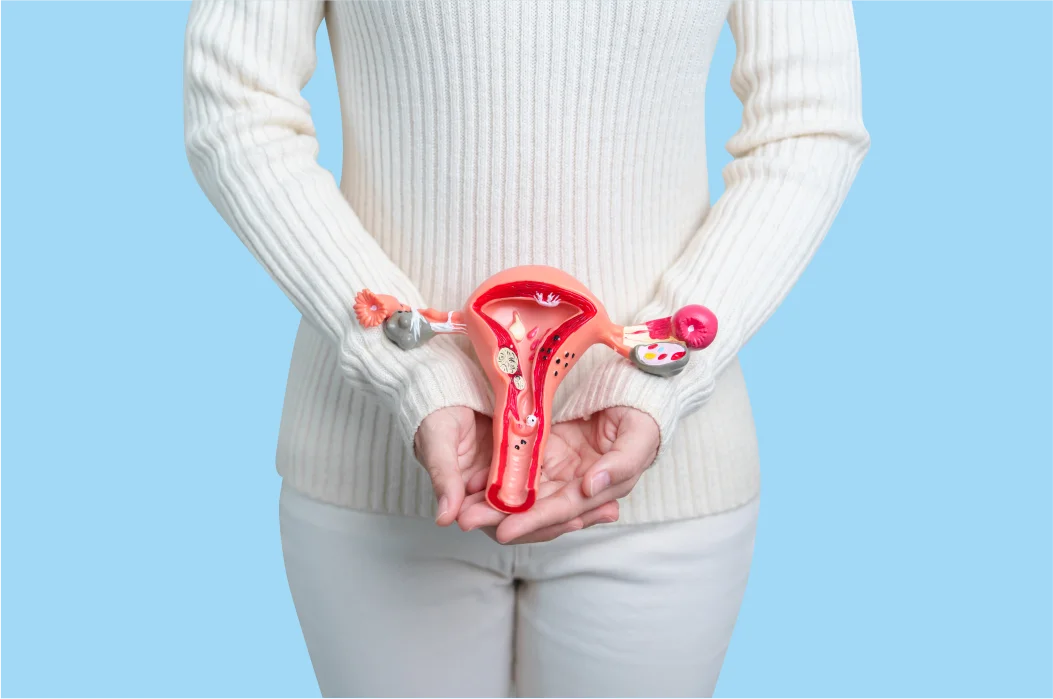Uterine Fibroid Treatment In Gurgaon

Uterine fibroids are quite a common condition in females. It is a non-cancerous growth of muscles that set up a place inside or around the woman's uterus. Uterine fibroids pose a significant risk to women's health, impacting their daily lives.
Our Uterine Fibroid Treatment in Gurgaon offers compassionate care and advanced solutions to address this concern. With a team of experienced, we prioritize your well-being, providing personalized treatments that match patient needs. Trust our expert doctors for uterine fibroids in Gurgaon to guide you through a comprehensive and effective approach, ensuring you regain control over your life. Embrace a future free from the challenges posed by uterine fibroids with our dedicated support.
What are uterine fibroids?
Uterine fibroids are non-cancerous growths in the uterus that often appear during childbearing years. These muscular tumors can vary in size and cause symptoms like heavy menstrual bleeding, pelvic pain, and frequent urination. This condition is usually harmless, and fibroids may require treatment if a woman starts feeling any pain or pregnancy issues.

Different types of fibroids
Intramural Fibroids: Embedded within the muscular wall of the uterus, these fibroids expand, potentially causing the uterus to stretch.
Subserosal Fibroids: Growing on the outer surface of the uterus, they can reach a size that distorts the uterine shape, appearing prominently on one side.
Submucosal Fibroids: Developing in the middle muscle layer (myometrium) of the uterus, these fibroids can affect the uterine cavity.
Pedunculated Fibroids: Stemming from subserosal fibroids, these have a slender base (stem) supporting the tumor, giving them the name pedunculated fibroids.
What causes fibroids?
Hormonal Influence: The growth of fibroids is linked to estrogen and progesterone, hormones integral to the menstrual cycle and crucial for uterine lining development during pregnancy.
Genetic Variations: Genetic changes within fibroids set them apart from normal uterine muscle cells, suggesting a genetic component in their development.
Extracellular Matrix (ECM): The extracellular matrix serves as a supportive material, binding cells together. It contributes to fibroid growth by storing growth factors and causing biological changes in the cells.
Role of Growth Factors: Fibroid growth is affected by different substances, such as growth factors like insulin-like growth factors.
What are the symptoms of uterine fibroids?
- Experience pelvic pain or pressure that feels unusual.
- Notice unusually heavy menstrual bleeding.
- Feel leg pains or backaches that are persistent.
- Encounter constipation that seems unrelated to other factors.
- Have difficulty emptying the bladder completely.
- Menstrual periods lasting longer than a week.
- Find yourself needing to urinate frequently.
If you notice these symptoms, prioritize your health and seek timely medical attention. For effective uterine fibroid treatment in Gurgaon, consult our experienced healthcare professionals for personalized care tailored to your needs.
How are uterine fibroids diagnosed?
Medical History: Initiate open conversations with your healthcare provider, sharing your medical history and discussing any concerning symptoms related to your menstrual cycle.
Thorough Exam: Expect a pelvic exam where your healthcare provider will manually check for abnormalities, using a speculum and gentle palpation.
Imaging Insight: Undergo ultrasound imaging, a non-invasive method using sound waves to reveal the presence, size, and location of uterine fibroids.
Hormone Check: Blood tests may be ordered to measure specific hormones associated with reproductive health, aiding in the diagnostic process.
Visual Exploration: In some cases, a hysteroscopy may be recommended, allowing direct visualization of the uterus by inserting a lighted tube.
Tissue Sampling: Biopsy, involving the collection of a small tissue sample, may be conducted to confirm fibroid presence or rule out other conditions.
Advanced Imaging: Additional tests like MRI or CT scans may be employed for a more detailed and comprehensive view of the pelvic region.
How are uterine fibroids treated?
Observation and Follow-Up
If fibroids are small (less than 3 cm) and asymptomatic, a watchful waiting approach is adopted, with regular ultrasound follow-ups to monitor their size.
MR-guided Focused Ultrasound Surgery (MRgFUS)
Non-invasive MRgFUS employs ultrasonic pulses to heat and eliminate fibroids, guided by an interventional radiologist; caution is advised for very large or multiple fibroids, with limited data on post-procedure childbearing safety.
Uterine Artery Embolization (UAE)
UAE involves injecting embolic agents into arteries to cut off blood flow, causing fibroid shrinkage; not ideal for future childbearing or large fibroids.
Myomectomy (Laparoscopic/Robotic/Open)
Myomectomy selectively removes fibroids, preserving the uterus; laparoscopic or robotic methods offer less pain, smaller incisions, and faster recovery, while open myomectomy is preferred for larger or complex fibroids.
Hysteroscopic Surgery
Hysteroscopic approach addresses submucous and pedunculated fibroids via the vagina, sometimes with preoperative measures for very large fibroids, aiding in hemoglobin build-up.
Our Services
Contact Info
- M 4, Near M Block Market, Greater Kailash-1, New Delhi, 110048
Contact Info
- Plot No. 7, Golf Course Rd, Sector 43, Gurugram, Haryana 122002
Hysterectomy
When dealing with uterine fibroids, hysterectomy may be considered as a final way to treat this condition. This option is typically chosen when childbearing is finished, after reaching 40 years of age, or if there's a presence of malignancy. It's a less invasive choice for treating large and complicated fibroids.
For comprehensive uterine fibroid treatment in Gurgaon, consult with skilled healthcare professionals who can guide you through suitable options tailored to your specific condition and preferences.
Top Uterine Fibroid Treatment Hospital In Gurugram
Experience exceptional care at the top uterine fibroid treatment hospital in Gurugram at SCI Hospital. Where our dedicated team of doctors for uterine fibroids in Gurgaon employs advanced techniques to provide personalized and effective solutions. With state-of-the-art facilities and a patient-centric approach, we ensure your comfort and well-being throughout your journey to recovery. Trust us for comprehensive uterine fibroid care that prioritizes your health. Choose our hospital for top-notch uterine fibroid treatment in Gurgaon and compassionate support. Your path to optimal health begins here.























